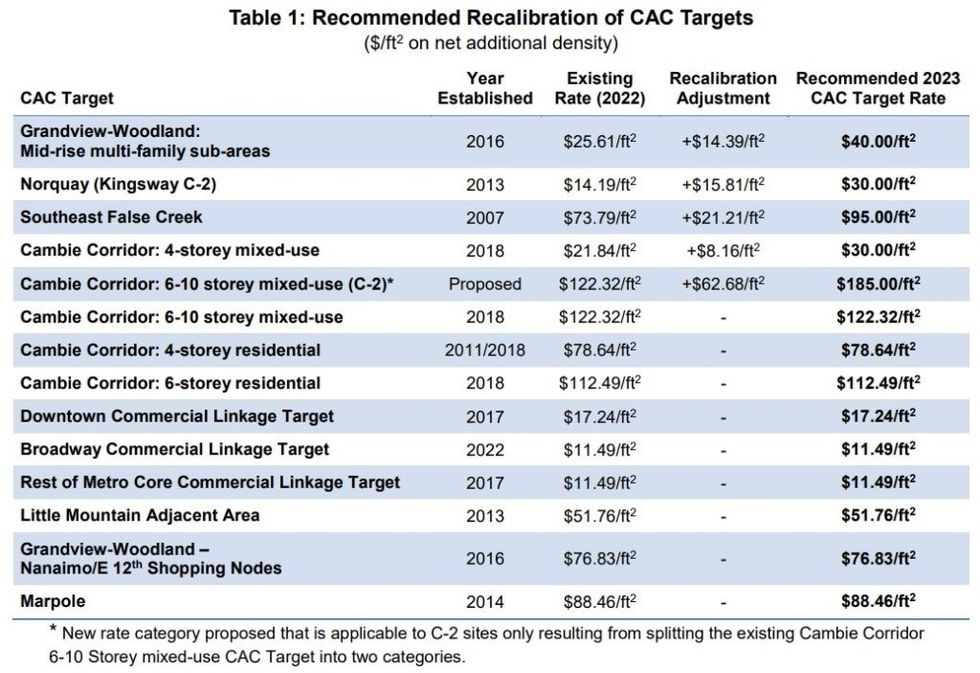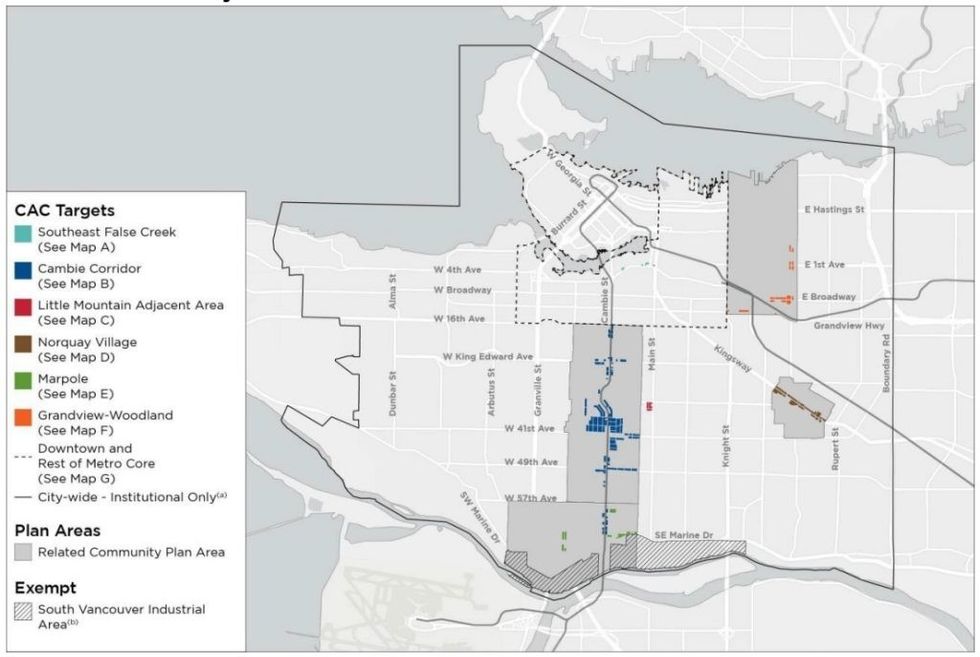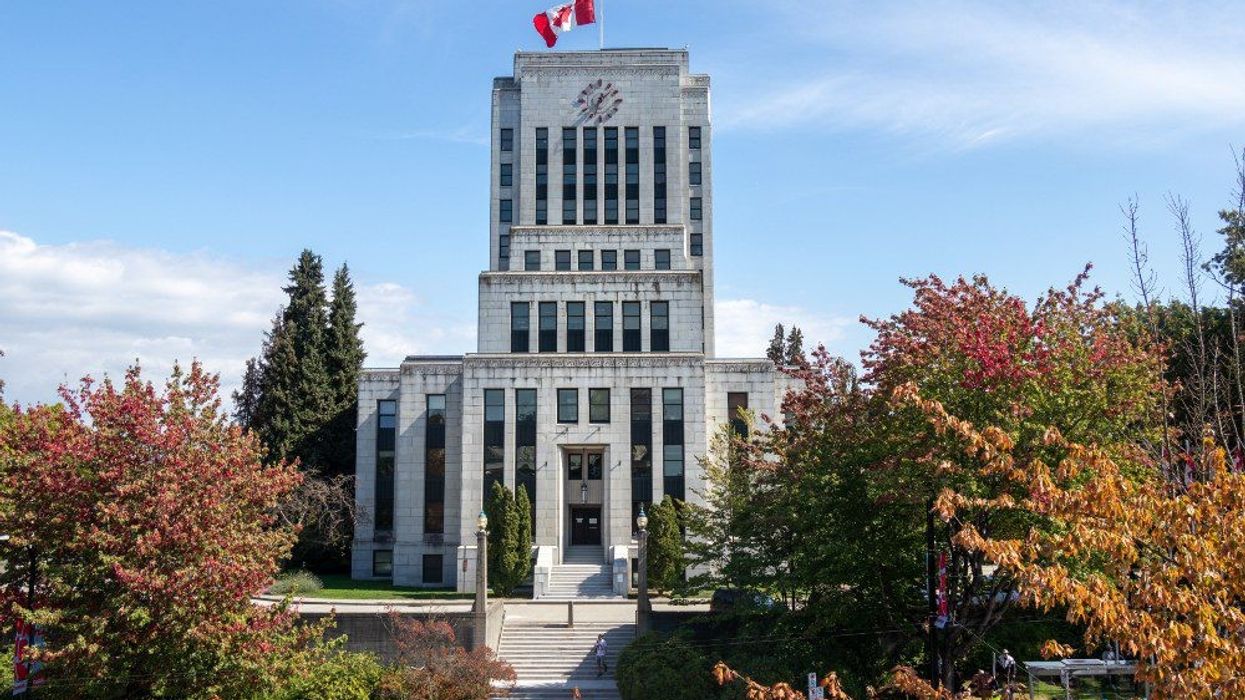The cost of everything is going up, and development costs are no exception as the City of Vancouver looks to increase the rates for Community Amenity Contributions (CACs).
The proposed increases would see CACs jump by more than 50% for some areas and building types, and by as much as 111% for one. Norquay (Kingsway C-2) would see that largest percent increase, taking existing CAC target rates from $14.19 per sq. ft to $30 per sq. ft. It's followed by Grandview-Woodland mid-rise multi-family sub-areas with a 56% increase to $40 per sq. ft, and Cambie Corridor six to 10 storey mixed-use builds with a 51% increase to $185 per sq. ft.
CACs are charged to developers in exchange for development rights granted through rezoning, and are typically provided in-kind -- in the form of affordable housing or childcare facilities, as examples -- or straight cash contributions that go towards funding infrastructure improvements in the City.
The City of Vancouver sets target rates for CACs by area for areas that don't have their own policies, but will often work with the developer to negotiate an appropriate value and form of the CACs, factoring in the impacts of rezoning, existing policies, and community plans.
In a report to Vancouver City Council, City staff said that target rates for CACs are recalibrated every four years -- or sooner if market conditions have changed dramatically -- in order to better reflect current "market conditions and viability of new housing supply and job space." The last updates were made in 2018 and 2020.
Council will be voting on the new recommended rates in a meeting on Tuesday, April 11, and those rates are as follows:


The City says that it hired two external consultants, Coriolis Consulting Corp. and Urban Systems Ltd., to analyze and identify the rate adjustments and that those consultants recommended increasing five targets while maintaining eight. The City also held engagement with various stakeholders beginning in October 2022, including meetings with the Urban Development Institute (UDI), National Association of Industrial and Office Properties (NAIOP), and the Homebuilders Association of Vancouver.
Target rates for CACs are adjusted annually using an inflationary index that is tied to annual changes in property values and construction costs, with the last adjustment approved on June 7, 2022. UDI and NAIOP said they were concerned by the newly proposed rate increases because they are higher than inflationary increases and would have a negative impact on the financial viability of certain projects. In response, staff said that the increases are not the result of inflation, but rather "to ensure that land lift is being secured as per the City's CAC policy, subject to economic testing and ability to pay."
"The timing of the proposed changes is particularly difficult, as high interest rates and diminishing sales numbers are already causing many projects to be paused until market conditions improve, so they can become financially viable again," wrote UDI President and CEO Anne McMullin in a letter to the City.
McMullin also adds that UDI believes the City should not be enforcing an "artificial floor" for CACs, and that rates should be truly responsive to fluctuations in the market, including decreases, instead of just increases. UDI is also recommending that the City consider allowing delivery of public amenities to be delayed, in cases where "it means enabling the delivery of much needed housing supply."
Meanwhile, the NAIOP, in a letter written by NAIOP Vancouver Executive Director Paul Kool, voiced concerns that the interest rates used in the economic testing (5.5%) were too low, and that lease rates assumptions ($40 per sq. ft) for industrial projects in certain areas of the City were too high.
READ: Vancouver High-Rise Development Fees 2X Surrey, 6X Burnaby, Highest In Canada
On the proposed increased targets, the City said that has "gradually increased the use of pre-set development contributions, such as CAC targets and Density Bonus Zoning contributions, to add certainty and predictability, and to improve and streamline the process for all parties involved." The City also estimates that 60% of rezonings with CACs follow the target approach (as opposed to a negotiated approach) and that the City's goal is to increase the use of targets.
In December, Councillor Sarah Kirby-Yung also filed a motion directing staff to report back to Council with an implementation plan for establishing fixed-rate CACs specifically for low-rise and mid-rise residential developments. That motion was approved by Council on December 6, 2022, and Council is currently awaiting the report, which is expected to be delivered in Q2 2023.
If the new rates for CACs are approved on April 11, they will come into effect beginning September 30.





















